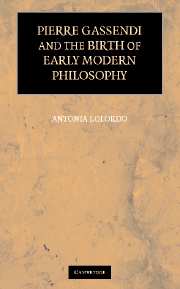Book contents
- Frontmatter
- Contents
- Preface
- References to Gassendi's Works
- Introduction
- 1 Gassendi's Life and Times
- 2 Gassendi's Philosophical Opponents
- 3 Skepticism, Perception, and the Truth of the Appearances
- 4 Cognition, Knowledge, and the Theory of Signs
- 5 Space and Time
- 6 Atoms and Causes
- 7 Bodies and Motion
- 8 Generation, Life, and the Corporeal Soul
- 9 The Metaphysics of Body
- 10 Faith, Reason, and the Immaterial Soul
- Bibliography
- Index
4 - Cognition, Knowledge, and the Theory of Signs
Published online by Cambridge University Press: 24 July 2009
- Frontmatter
- Contents
- Preface
- References to Gassendi's Works
- Introduction
- 1 Gassendi's Life and Times
- 2 Gassendi's Philosophical Opponents
- 3 Skepticism, Perception, and the Truth of the Appearances
- 4 Cognition, Knowledge, and the Theory of Signs
- 5 Space and Time
- 6 Atoms and Causes
- 7 Bodies and Motion
- 8 Generation, Life, and the Corporeal Soul
- 9 The Metaphysics of Body
- 10 Faith, Reason, and the Immaterial Soul
- Bibliography
- Index
Summary
Gassendi is an empiricist of a more radical form than his scholastic predecessors. In the tradition he was most familiar with, the process of abstracting from sensible species to intellectual species was often held to add new content: the essence, which is not contained within the sensible species. Gassendi, like other early moderns, keeps the term “abstraction, ” but for him abstraction is a process of cutting away content rather than creating new content. Hence it cannot enable us to grasp mind-independent universals or essences.
Gassendi enshrines the claims that all ideas originate from sense and that all content is acquired through sense in the fifth canon of his reconstructed Epicurean logic:
Canon V: Everything that is an anticipation or praenotion [that is, idea] in the mind depends on sensations, either by incursion or proportion or similitude. (1.54b)
There are no ideas innate in us, merely an “innate faculty of knowing” that allows us to acquire ideas through the senses and then construct new ideas from them (3.379a). Most of Gassendi's logic is devoted to explaining how this innate faculty of knowing constructs adequate ideas of things we do not sense on the basis of what's acquired through the senses. But as well as providing this account of simple apprehension, Gassendian logic also includes judgment or proposition, by which ideas are combined into sentential complexes, and reasoning.
- Type
- Chapter
- Information
- Pierre Gassendi and the Birth of Early Modern Philosophy , pp. 83 - 99Publisher: Cambridge University PressPrint publication year: 2006

